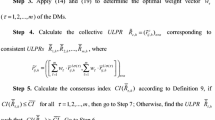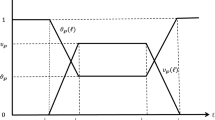Abstract
The exploitation and utilization of renewable energy is an important issue that contributes to the sustainable development of the national economy. This paper deals with the utilization mode selection of renewable energy in a group decision making (GDM) problem with multiple stakeholders whose assessments are represented as the probabilistic linguistic preference relations (PLPRs). For GDM problems with PLPRs, two requirements should be satisfied before selection process: individual consistency and group consensus. In this regard, a premetric-based consensus measure of PLPRs is defined to describe the consensus level among stakeholders and a consensus improvement model is developed to modify the identified PLPRs while guaranteeing the consistency of the adjusted PLPRs. Then, the proposed method is applied to solve the utilization modes selection of multiple renewable energy in the Jinsha River upper reaches. Finally, the robustness and comparative analysis validate the good adaptability, high efficiency and better practical use values of this method.




Similar content being viewed by others
Explore related subjects
Discover the latest articles, news and stories from top researchers in related subjects.Data availability
The authors confirm that the data supporting the findings of this study are available within the article.
References
Bilal BO, Sambou V, Ndiaye PA et al (2010) Optimal design of a hybrid solar–wind-battery system using the minimization of the annualized cost system and the minimization of the loss of power supply probability (LPSP). Renew Energy 35(10):2388–2390
Chodkowska-Miszczuk J, Martinat S, Cowell R (2019) Community tensions, participation, and local development: Factors affecting the spatial embeddedness of anaerobic digestion in Poland and the Czech Republic. Energy Res Soc Sci 55:134–145
Feng X, Pang X, Zhang L (2020) On consistency and priority weights for interval probabilistic linguistic preference relations. Fuzzy Optimization Decis Mak 19(4):529–560
Freeman RE (2010) Strategic Management: A Stakeholder Approach. Cambridge University Press, Cambridge
Gao J, Xu Z, Liang Z et al (2019) Expected consistency-based emergency decision making with incomplete probabilistic linguistic preference relations. Knowl Based Syst 176:15–28
Gao J, Xu Z, Ren P et al (2019) An emergency decision making method based on the multiplicative consistency of probabilistic linguistic preference relations. Int J Mach Learn Cybern 10(7):1613–1629
Herrera F, Herrera-Viedma E, Verdegay JL (1996) A model of consensus in group decision making under linguistic assessments. Fuzzy Sets Syst 79(1):73–87
Hou F (2015) The prametric-based GDM selection procedure under linguistic assessments. In: IEEE International Conference on Fuzzy Systems, pp 1–8.
Hou F (2019) Triantaphyllou E. An iterative approach for achieving consensus when ranking a finite set of alternatives by a group of experts. Eur. J. Oper. Res 275(2):570–579
Hu G (2019) Exploration on utilization models for renewable energy of sichuan-tibet section in the jinsha river upper reaches. Huadian Technol 11(41):62–65
Liu A, Qiu H, Lu H et al (2019) A consensus model of probabilistic linguistic preference relations in group decision making based on feedback mechanism. IEEE Access 7:148231–148244
Liu PD, Li, Y, Zhang XH, Pedrycz W (2022) A Multiattribute group decision-making method with probabilistic linguistic information based on an adaptive consensus reaching model and evidential reasoning. IEEE Trans. Cybern. https://doi.org/10.1109/TCYB.2022.3165030
Liu PD, Zhang K, Wang P, Wang F (2022) A clustering-and maximum consensus-based model for social network large-scale group decision making with linguistic distribution. Inf Sci 602:269–297
Mercer N, Sabau G, Klinke A (2017) “Wind energy is not an issue for government”: Barriers to wind energy development in Newfoundland and Labrador, Canada. Energy Policy 108:673–683
Pang Q, Wang H, Xu Z (2016) Probabilistic linguistic term sets in multi-attribute group decision making. Inf Sci 369:128–143
Richards G, Noble B, Belcher K (2012) Barriers to renewable energy development: a case study of large-scale wind energy in Saskatchewan, Canada. Energy Policy 42:691–698
Song Y, Hu J (2019) Large-scale group decision making with multiple stakeholders based on probabilistic linguistic preference relation. Appl Soft Comput 80:712–722
Wang L, Singh C (2009) Multicriteria design of hybrid power generation systems based on a modified particle swarm optimization algorithm. IEEE Trans Energy Convers 24(1):163–172
Xu ZS (2004) EOWA and EOWG operators for aggregating linguistic labels based on linguistic preference relations. Int. J. Uncertain. Fuzziness Knowl. Based Syst 12(6): 791–810.
Xu ZS (2006) Incomplete linguistic preference relations and their fusion. Inf Fusion 7(3):331–337
Zhang YX, Xu ZS, Liao HC (2017) A consensus process for group decision making with probabilistic linguistic preference relations. Inf Sci 414:260–275
Zhang YX, Xu ZS, Wang H et al (2016) Consistency-based risk assessment with probabilistic linguistic preference relation. Appl Soft Comput 49:817–833
Zhang YX, Xu ZS, Liao HC (2018) An ordinal consistency-based group decision making process with probabilistic linguistic preference relation. Inf Sci 467:179–198
Zhou H, Zhu N, Yang C et al (2018) Comprehensive performance evaluation method of hybrid renewable energy system based on exergy theory. Build Energy 46(8):53–58
Author information
Authors and Affiliations
Corresponding author
Additional information
Publisher's Note
Springer Nature remains neutral with regard to jurisdictional claims in published maps and institutional affiliations.
Rights and permissions
Springer Nature or its licensor (e.g. a society or other partner) holds exclusive rights to this article under a publishing agreement with the author(s) or other rightsholder(s); author self-archiving of the accepted manuscript version of this article is solely governed by the terms of such publishing agreement and applicable law.
About this article
Cite this article
You, X., Hou, F. A novel consensus model with probabilistic linguistic preference relation for the utilization mode selection of renewable energy sources. Int. J. Mach. Learn. & Cyber. 14, 1845–1861 (2023). https://doi.org/10.1007/s13042-022-01733-1
Received:
Accepted:
Published:
Issue Date:
DOI: https://doi.org/10.1007/s13042-022-01733-1




